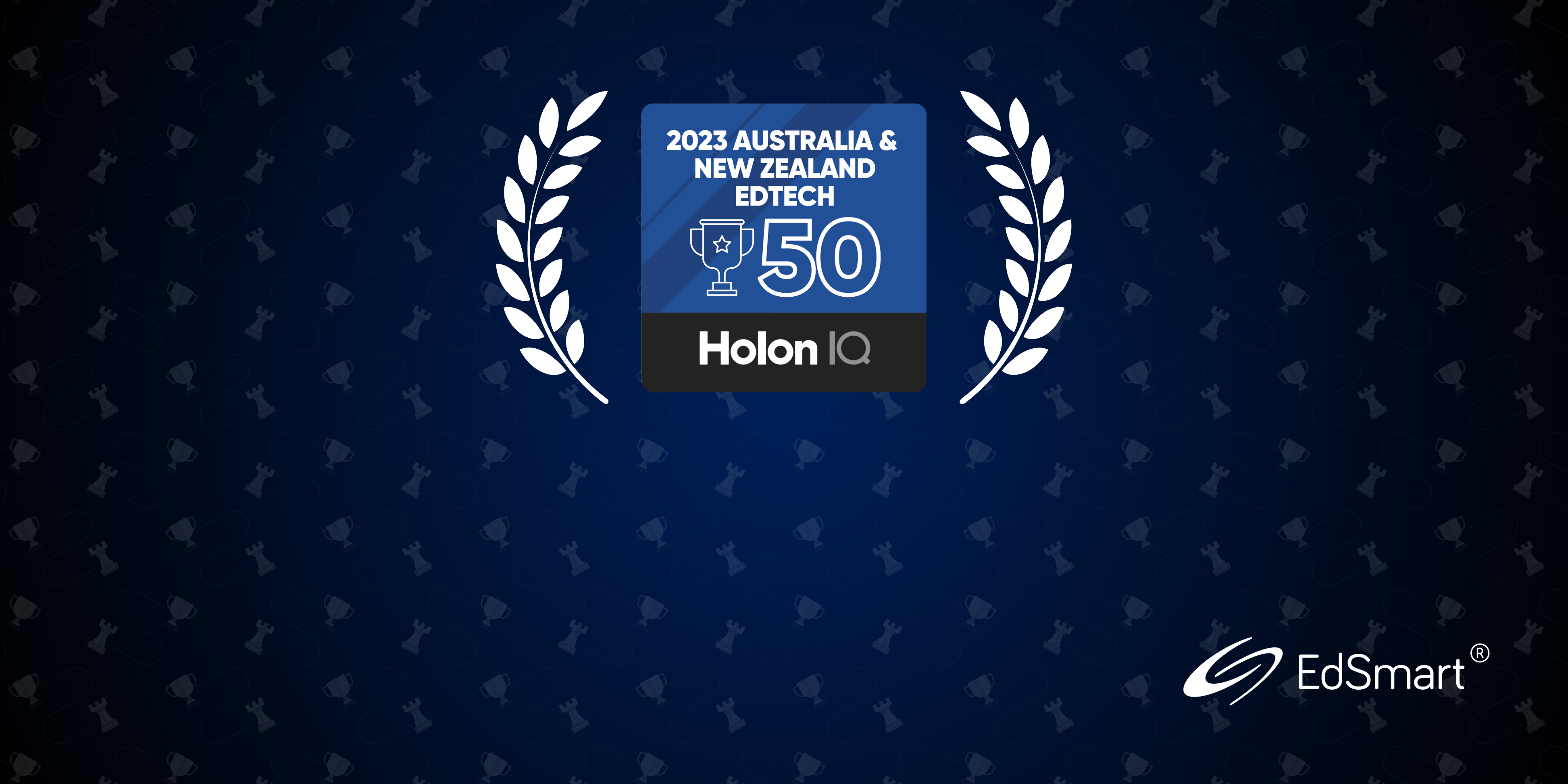For the third year running, HolonIQ – the global climate, education and health consultancy and market intelligence firm – has named EdSmart one of Australia and New Zealand’s 50 Most Promising EdTech startups.
HolonIQ’s coveted list identifies the fastest-growing and most innovative learning, teaching and up-skilling EdTech startups in the region, which makes EdSmart’s third consecutive inclusion a noteworthy achievement. As well as Australia and New Zealand, HolonIQ identifies the top 50 EdTech startups in Europe, Scandinavia, Africa, the Middle East, Asia, and Latin and North America.
“We’re honoured to see our name on the list again,” says David Eedle, Co-founder and CEO of EdSmart. “Most of the time, it’s just heads-down and tails-up work for us – refining our platform, responding to customer requirements and moving forward with tech advancements – so it never fails to delight us to know that someone else, like HolonIQ, is watching from the sidelines. Knowing that gives us that extra kick-along to improve and do more for schools and school jurisdictions.”
How the HolonIQ List comes together
In an interview with Vietnam’s Edtech Agency, Maria Spies, Co-founder and Co-CEO of HolonIQ, said, that when it came to selecting the organisations that make their Most Promising EdTech Startup lists, they’re determined to leave no stone unturned. She explained that the heart of the search is ensuring no disproportionate focus on big players in big markets.
“It’s really important to us to do a bottom-up screening from each of these geographies,” Maria admitted. “It takes about six weeks probably to do each list because there’s a lot of companies, and we want to make sure we’re looking at each of them.”
After putting together a panel of well-credentialled analysts and experts in the regions of assessment, Maria said the panellists consider a range of metrics gleaned from HolonIQ’s Global Intelligence Platform.
“HolonIQ maintains a very in-depth platform database of the organisations and lots of data about those organisations. And so, we use our own data — and any data that’s provided from an application process. So our analysts do that work… And then we have multiple experts that operate inside each market who provide feedback because they know the market as well… So it’s sort of a crosscheck.”
As well as the picture painted by their data, and the expertise of the panellists involved, contenders for the list are benchmarked against five key areas of analysis. The first criterion, Maria explained, is the market and – for the assessors – it’s not just a startup’s geographical market.
“What is the market in which the company operates?” Maria explained. “Now that could be not just the geographic market, like Vietnam versus Indonesia, but tutoring or language learning or upskilling or whatever – those sorts of markets. We look for the quality of that market; the relative attractiveness of that market. How is that market growing?”
The second aspect of the assessment is the organisation’s product: What’s unique about it, and what kind of an impact is it having in the space it’s competing in? “What’s unique,” she asks, “about the company itself?”
Thirdly, the organisation’s diversity is scrutinised in terms of expertise, experience and leadership, while the fourth consideration is capital: “That does not mean that you have to have raised money, but we look at the ability of the startup to raise capital. That could be through revenue, or it could be through external funding, or a combination of both things. We look for the ability to grow through having some capital.”
The final and most important criterion for Maria is momentum: “We look for positive changes in the organisation, [changes] in the EdTech over time, the size of the company, its number of employees, revenue, [and] the velocity impact of that company.”
For HolonIQ, it’s important the lists have cachet. Still, Maria contextualised them as a way of connecting different regions around the world and, as far as the bigger picture is concerned, driving and sharing innovation to deliver better learning outcomes.
“That helps us in our work to see where things are heading,” she said. “How are Southeast Asia language learning models differing to Europe or to Latin America, for example? And so doing this sort of exercise helps us to really identify the underlying trends and shape of the market, and where things are heading. And that helps us and that helps our customers.”
“It’s very important to the future of accessing education, of scaling education, of educational outcomes because there are so many people in the world that need further learning. And so part of it for us is making sure we’re surfacing those companies, those models, those innovations that have the potential to impact so many learners globally.”
“It’s a mystery as to how EdSmart has appeared on this year’s list,” concludes David Eedle. “Because we didn’t put in an application! But I hope we can put that down to us being on HolonIQ’s radar for the last couple of years and them watching what we’ve been doing over the last 12 months.”
HolonIQ’s list of Australia & New Zealand’s 50 Most Promising EdTech Startups was published in October 2023.



